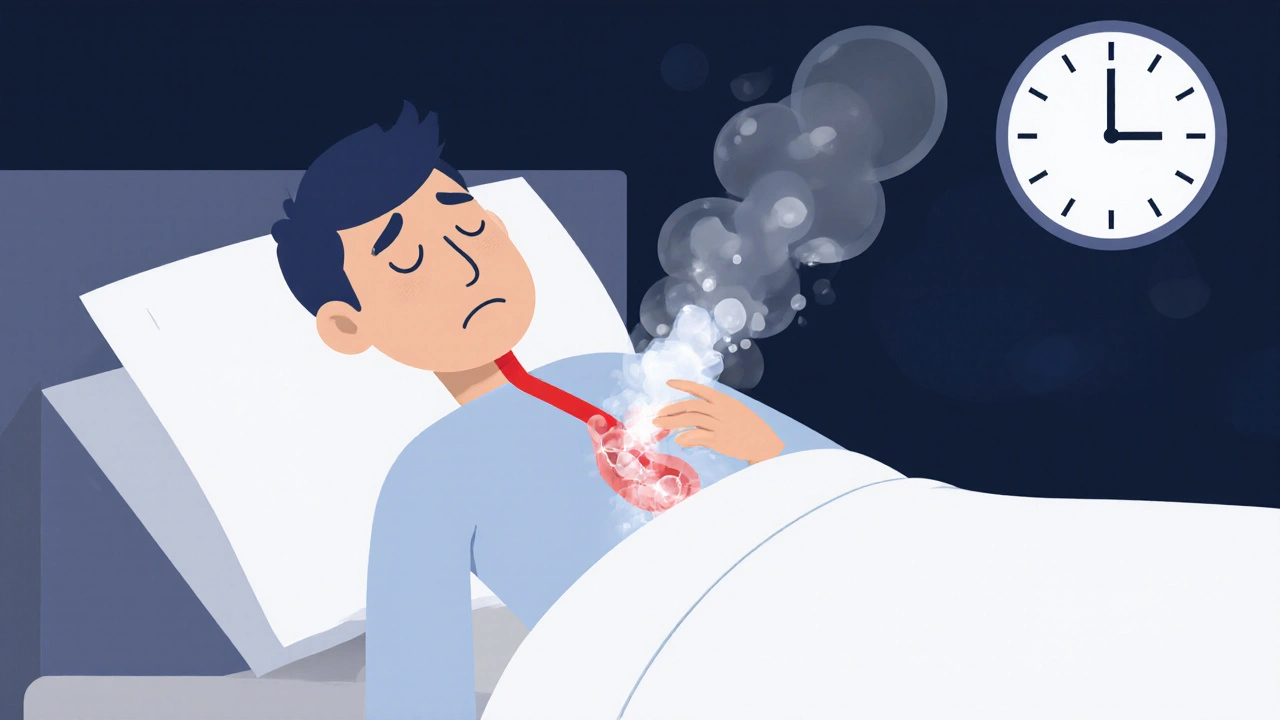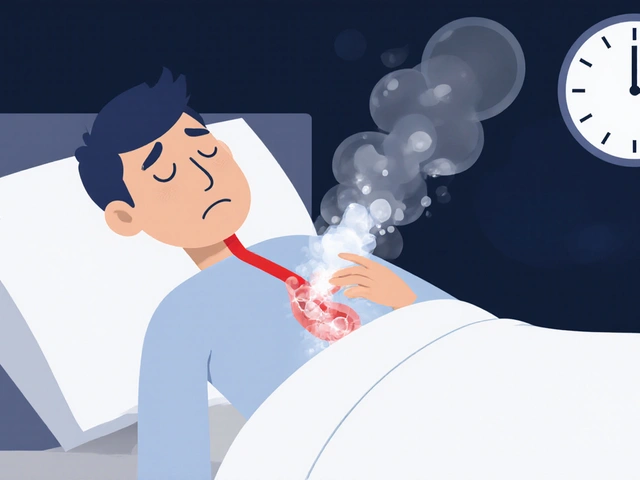Ever had that heavy, stuck feeling in your chest-like you can’t take a full breath-and no cough or cold seems to explain it? If you’ve also noticed a sour taste in your mouth, a scratchy throat, or waking up with a hoarse voice, you might be dealing with acid reflux, not a lung infection. Chest congestion from acid reflux is more common than most people realize, and it’s often misdiagnosed as asthma, bronchitis, or even heart trouble.
What’s Really Happening in Your Chest?
Acid reflux isn’t just about heartburn. When stomach acid travels up the esophagus, it doesn’t always stop there. In some cases, tiny amounts of acid get aspirated into the windpipe and lungs. This triggers inflammation, mucus production, and muscle tightening in the airways. The result? A congested, tight chest that feels like you’re breathing through a straw-even when your lungs are perfectly healthy.
This is called laryngopharyngeal reflux (LPR), or "silent reflux." Unlike classic GERD, you might not feel burning. Instead, you get respiratory symptoms: chronic cough, wheezing, postnasal drip, and that persistent chest congestion. A 2023 study in the Journal of Gastroenterology found that over 40% of patients with unexplained chest tightness and chronic cough had silent reflux as the root cause.
Why Acid Reflux Triggers Congestion
Your esophagus and airway are neighbors. When acid hits the lower esophagus, it can stimulate nerves that cause the bronchial tubes to contract. This reflex is called the laryngotracheal reflex. It’s your body’s attempt to protect the lungs-but it ends up making breathing harder.
At the same time, acid irritates the throat and upper airway. Your body responds by producing extra mucus to coat and soothe the irritated tissue. That mucus drips down the back of your throat (postnasal drip), then pools in your chest. You feel it as congestion. It’s not phlegm from an infection-it’s mucus made by irritation, not illness.
Some people notice this worse at night. Lying flat makes it easier for acid to creep up. Morning chest tightness, a hoarse voice, or needing to clear your throat constantly upon waking are classic signs.
How to Tell It’s Reflux, Not a Cold or Asthma
Here’s how to spot the difference:
- Cold or flu: Fever, body aches, runny nose, symptoms last 7-10 days, then clear up.
- Asthma: Wheezing, shortness of breath during exercise or at night, improves with inhalers.
- Acid reflux: No fever, no runny nose, symptoms worsen after meals, lying down, or bending over. Often linked to eating spicy food, coffee, chocolate, or alcohol.
Also, reflux-related chest congestion rarely responds to decongestants or inhalers. If your doctor gives you an inhaler and nothing changes, reflux could be the real issue.
What to Do When Reflux Is the Cause
Fixing the congestion starts with stopping the acid from rising. Here’s what actually works:
- Eat dinner at least 3 hours before bed. Lying down with a full stomach is like tipping a bottle of soda. Gravity is your best friend.
- Avoid trigger foods. Citrus, tomatoes, chocolate, caffeine, fried food, and alcohol are top offenders. Even mint can relax the lower esophageal sphincter and let acid escape.
- Elevate your head while sleeping. Use a wedge pillow or raise the head of your bed 6-8 inches. Regular pillows won’t cut it-they just bend your neck, not your torso.
- Wear loose clothing. Tight belts or pants put pressure on your stomach and push acid upward.
- Quit smoking. Smoking weakens the esophageal valve and increases acid production.
Medication can help, but it’s not a cure. Proton pump inhibitors (PPIs) like omeprazole reduce acid, but they take 2-4 weeks to fully work. H2 blockers like ranitidine (though less used now) can help with immediate relief. Always talk to a doctor before starting anything-long-term PPI use can have side effects.
When to See a Doctor
Most cases improve with lifestyle changes. But if you have:
- Chest pain that radiates to your arm or jaw
- Difficulty swallowing or pain when swallowing
- Unexplained weight loss
- Coughing up blood
- Symptoms lasting more than 4 weeks despite lifestyle changes
...you need medical evaluation. These could signal something more serious like Barrett’s esophagus, esophagitis, or even early signs of esophageal cancer.
Real-Life Example: Sarah’s Story
Sarah, 42, from Durban, thought she had seasonal allergies. Every morning, she woke up congested, with a sore throat and a dry cough. She took antihistamines for months. Nothing helped. Then she noticed her symptoms got worse after eating pizza or drinking wine in the evening.
She cut out evening meals after 7 p.m., stopped drinking wine, and started sleeping on a wedge pillow. Within two weeks, her chest felt lighter. After a month, her morning cough was gone. She never went on medication. Just changed habits.

What Doesn’t Work
Antacids like Tums give quick relief for heartburn, but they don’t stop acid from rising over time. They’re not strong enough for reflux-induced congestion. Drinking milk might feel soothing, but it can later stimulate more acid production. And don’t rely on herbal teas like chamomile as a cure-they might help a little, but they won’t fix the root problem.
Long-Term Outlook
With the right changes, most people see big improvements in 4-8 weeks. The chest congestion lifts. The cough fades. Breathing gets easier. But if you go back to old habits-late meals, spicy food, lying down after eating-the symptoms return.
This isn’t about being perfect. It’s about being consistent. Even cutting out just two trigger foods and avoiding food 3 hours before bed can make a huge difference.
Prevention Is the Best Treatment
Once you know acid reflux is causing your chest congestion, you’re not stuck with it forever. You can take control. Small, daily choices-when you eat, what you eat, how you sleep-add up to major relief.
Don’t keep blaming your lungs. Your stomach might be the real culprit. Listen to your body. Track your symptoms. Make one change this week. You might be surprised how much better you feel.
Can acid reflux cause chest congestion without heartburn?
Yes. This is called silent reflux or LPR. Many people with reflux-induced chest congestion never feel heartburn. Instead, they get chronic cough, hoarseness, throat clearing, or a feeling of something stuck in the throat. The acid irritates the airway without triggering the classic burning sensation.
How long does it take for chest congestion from reflux to go away?
Most people notice improvement within 2-4 weeks of making lifestyle changes like avoiding late meals and trigger foods. Full relief can take up to 8 weeks, especially if the airways are inflamed from long-term exposure. Medications like PPIs speed things up but aren’t always necessary if habits change.
Is chest congestion from reflux dangerous?
Not usually, but long-term exposure to stomach acid in the airways can lead to chronic inflammation, asthma-like symptoms, or even lung damage over time. It can also increase the risk of aspiration pneumonia in older adults or those with weakened swallowing reflexes. Treating it early prevents complications.
Can I use an inhaler for chest congestion caused by reflux?
Inhalers won’t fix the root problem. They might temporarily open airways if reflux triggers bronchospasm, but they won’t stop the acid from rising. If your inhaler doesn’t help, reflux is likely the cause. Treating the reflux will give you lasting relief-unlike the temporary fix from an inhaler.
What foods should I avoid to reduce reflux-related congestion?
Avoid citrus fruits, tomatoes, chocolate, coffee, tea, alcohol, fried or fatty foods, spicy dishes, carbonated drinks, and mint. Even large meals can trigger reflux. Eat smaller portions and avoid eating within 3 hours of lying down.
Does sleeping position really matter?
Yes. Lying flat lets acid flow easily into the esophagus and even into the airway. Elevating your head 6-8 inches with a wedge pillow or raising the head of your bed helps gravity keep acid down. Regular pillows don’t work-they only tilt your neck, not your stomach.
Can children get chest congestion from acid reflux?
Yes. Infants and young children often show reflux as chronic cough, wheezing, or recurrent pneumonia rather than vomiting or heartburn. If a child has persistent respiratory symptoms without infection, reflux should be considered. Always consult a pediatrician for proper diagnosis.
Can stress make reflux-related chest congestion worse?
Yes. Stress doesn’t cause reflux, but it increases stomach acid production and slows digestion. It can also make you more sensitive to irritation in the throat and chest. Managing stress through breathing, walking, or sleep hygiene can reduce symptom severity.







Stop blaming your lungs. Your stomach’s the culprit. Cut out late meals, avoid chocolate and coffee, and sleep on a wedge. Two weeks later, your chest feels like it’s been freed from a vice. No meds needed.
LPR is a vagal dysregulation cascade triggered by lower esophageal sphincter incompetence compounded by diaphragmatic hiatal displacement. Standard PPIs are inadequate without neuromodulatory dietary intervention.
You think this is about food??!! It’s the government. They’ve been pumping fluoride into the water since 2012 to make us cough so they can sell inhalers… and the pharmaceutical giants? They own the FDA, the journals, the doctors… You’re being manipulated into believing this is ‘reflux’-it’s chemical warfare, and you’re the lab rat.
And don’t even get me started on wedge pillows-they’re just a distraction while they patent the real cure: subcutaneous acid-neutralizing nanobots… which they won’t release until 2037.
Why do you think your cough clears up when you stop eating pizza? Because the pizza companies are in on it. They know the acid triggers the symptoms… so they sell you the poison, then sell you the ‘solution’.
Wake up. This isn’t medicine. It’s marketing dressed in white coats.
I’ve been tracking this since 2018. Every ‘study’ you cite? Funded by Big Pharma. Even that ‘2023 Journal of Gastroenterology’? Paid for by AstraZeneca. They want you dependent on PPIs. Forever.
My cousin in Nigeria-he stopped eating Western food, started chewing neem leaves, drank boiled guava bark tea… his chest congestion vanished in 3 days. No doctors. No pills. Just ancestral wisdom.
They don’t want you to know this. They profit from your suffering.
Don’t trust the system. Trust your body. And stop eating anything that comes in a plastic wrapper.
It’s fascinating how the body turns a mechanical failure-acid reflux-into a psychological narrative of respiratory distress. We don’t just experience symptoms; we interpret them through the lens of illness, of contagion, of crisis. But what if the body isn’t broken? What if it’s just… communicating? The chest congestion isn’t a disease-it’s a language. And we’ve been listening with the wrong ears.
Perhaps the real problem isn’t the acid rising, but our refusal to sit still long enough to hear why it’s rising at all.
Stress. Suppression. The quiet rage we swallow daily. Maybe the stomach acid is just the physical echo of everything we’ve refused to digest emotionally.
Fix the pillow. Fine. But what about the silence?
So you’re telling me I gotta stop eating pizza at midnight and sleep like a mummy with a brick under my mattress… just so I don’t feel like I’m drowning in my own lungs? Nah. I’ll just keep popping Tums and calling it a day. This ain’t my problem.
They don’t want you to know this… but the wedge pillow? It’s a trap. The real solution is sleeping on a slight incline… but facing north. Magnetic alignment disrupts acid reflux at the quantum level. They’ve buried this in the NIH archives under ‘Project Nightfall’.
And the ‘trigger foods’? All genetically modified. Glyphosate weakens your LES. The FDA knows. The WHO knows. But they’re too busy approving new PPIs to tell you that organic kale and Himalayan salt are the only real cures.
I’ve been sleeping on a bed made of copper coils since 2021. My reflux vanished. No one believes me. That’s because they’re being monitored.
Also-why is everyone so quick to blame food? What about the EMFs from your phone? You charge it next to your bed? That’s the real culprit. Acid reflux is just the symptom. The disease is digital enslavement.
Stop using your phone after 8 PM. Sleep with it in a Faraday cage. And pray. Praying lowers stomach pH. Science says so.
My mom had this for years. Doctors called it asthma. Turned out it was reflux. She changed her habits-no wine after dinner, no late snacks, raised bed. Three weeks later, she could breathe again. No pills. Just common sense.
This whole post is a Western capitalist scam. In India, we don’t have ‘silent reflux’-we have ‘digestive imbalance’ caused by too much sugar, too much stress, and too much Western diet. Your ‘wedge pillow’? Use a stack of old books. Your ‘PPIs’? Drink warm water with ginger and ajwain. Your ‘trigger foods’? Stop eating cheese and pizza. Simple. No jargon. No profit motive. Just truth.
And don’t you dare call it ‘LPR’ like it’s some fancy medical term. It’s just your body saying: ‘I’m tired of your garbage.’